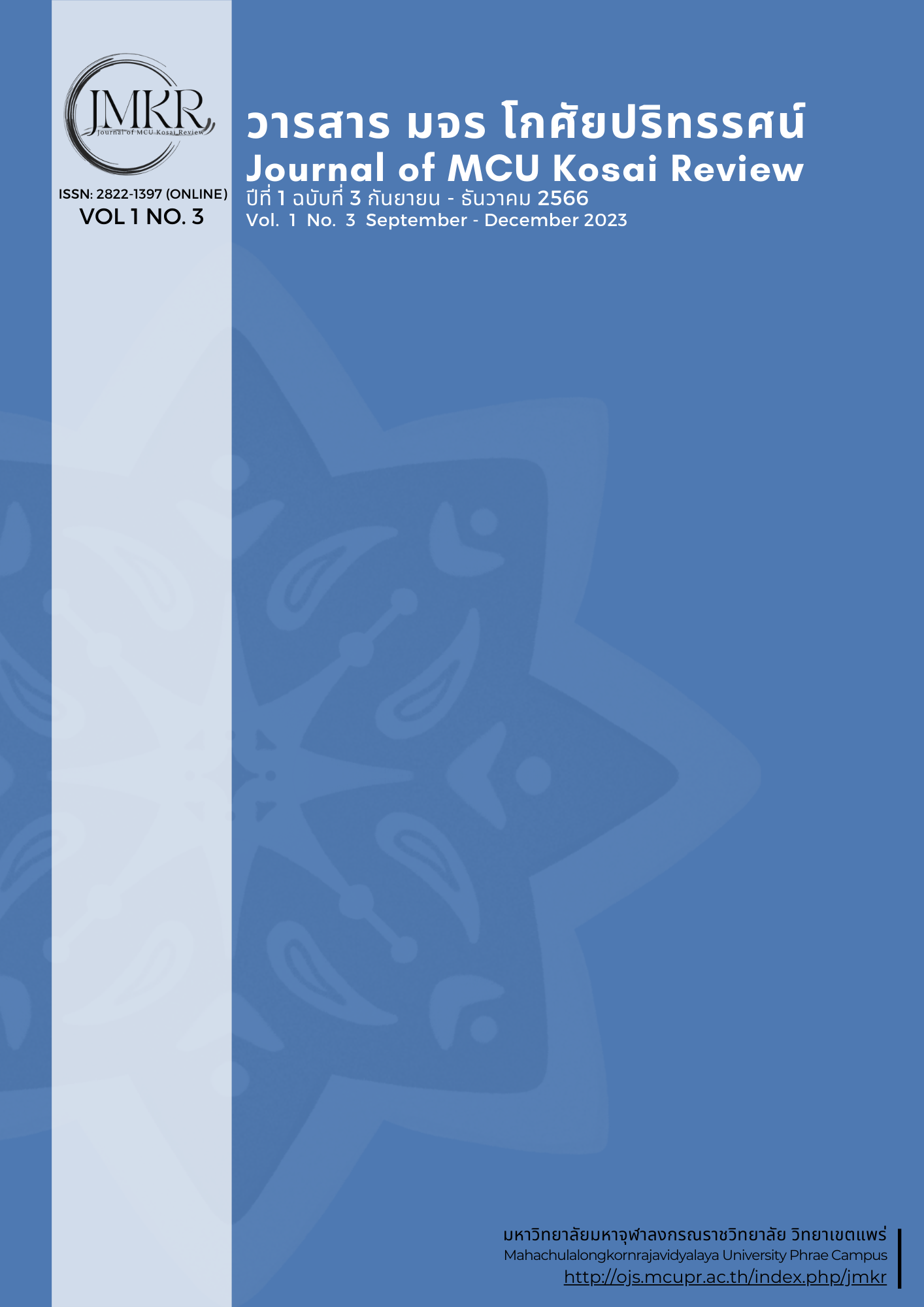A Study of The Motivation for Upholding the Five Precepts of People in Mae Yang Kwao Community, Rong Kwang District, Phrae Province
Keywords:
Motivation, Upholding the Five Precepts, Mae Yang Kwao CommunityAbstract
This research has three objectives: 1) to study the motivation for upholding the five precepts of people in Mae Yang Kwao Community, Rong Kwang District, Phrae Province according to Buddhism, 2) To study the behavior of the five precepts of the people in Mae Yang Kwao community. Rong Kwang District, Phrae Province, and 3) to analyze the motivations for Motivation for Upholding the five precepts of people in Mae Yang Kwao Community, Rong Kwang District, Phrae Province. It's mixed methods research between quantitative research methods with qualitative research. The field study from in-depth interviews with 15 key informants, then analyzing the content of the thesis.
The research Finding
- The motivation according to Buddhism was found that The Buddha understood the disposition of the listeners and therefore was able to choose different methods that matched the original basis of that person. and pointed out the Buddhist way of motivating in keeping the 5 precepts, there are 4 Buddhist methods; (1) Apinya and intrinsic motivation, (2) Desire motivation, (3) Penalty motivation, and (4) Goal motivation.
- From the study, it was found that people did not keep the 5 precepts on a regular basis. But there is a time when keeping the 5 precepts on an important occasion and most of the people cannot keep all the 5 precepts, including the strict precepts cannot be done. Regarding the problems and obstacles in keeping the 5 precepts of the majority of people, it was found that the occupations that had to be relied on to earn a living and support the family. which is not conducive to keeping all the precepts. Online media consumption affects expression behavior. and receiving true or false information and the place that affects the precepts Indicates that the temple is conducive to keeping the precepts well. But at home or at work it is difficult to control and keep precepts.
- An analysis of the motivations for keeping the 5 precepts of the people in the community It consisted of 2 types of motivation: 1) extrinsic motivation, consisting of 4 issues: (1) motivation from temples and monks, (2) motivation from traditions, (3) motivation from the 5 precepts village project, and (4) motivation from media and advertising in part 2) internal motivation, namely good motivation, which is the basic needs in life reflected from knowledge and virtue, including the penalty caused by the violation of the 5 precepts, resulting in understanding leading to the practice of meritorious dharma (dharma chantha) until being able to develop oneself
References
ณัฐพล บัวอุไร.(2563) “ผลการจัดการเรียนการสอนโดยใช้สื่อสังคมออนไลน์ตามทฤษฎีการสร้างองค์ความรู้ด้วยตนเอง วิชาการสร้างงานสื่อผสม เรื่องคอมพิวเตอร์และอินเทอร์เน็ต ระดับชั้นมัธยมศึกษาปีที่ 4 โรงเรียนเตรียมอุดมศึกษาพัฒนาการ ลำลูกกา”. วิทยานิพนธ์ศึกษาศาสตรมหาบัณฑิต สาขาวิชาการวิจัยและประเมินทางการศึกษามหาวิทยาลัยเกษตรศาสตร์. บัณฑิตวิทยาลัย: มหาวิทยาลัยเกษตรศาสตร์.
ธนกร ธีระวุฒิชัยกิจ.(2562) “ปัจจัยการใช้สื่อสังคมออนไลน์ในการอ่านนวนิยายในกลุ่มเจเนอเรชั่นเบบี้บูมเมอร์และเจเนอเรชั่นเอ็กซ์”. วิทยานิพนธ์บริหารธุรกิจมหาบัณฑิต. (คณะบริหารธุรกิจ: มหาวิทยาลัยนเรศวร
นายอาทิตย์ หลวงละ.(2559) “การใช้เว็บไซต์เฟสบุ๊กทางอินเทอร์เน็ตของพระสงฆ”. วิทยานิพนธ์วารสาร
ศาสตรมหาบัณฑิต สาขาวิชาสื่อสารมวลชน. (คณะวารสารศาสตร์และสื่อสารมวลชน:มหาวิทยาลัยธรรมศาสตร์.
พระครูสมุห์มานิตย์ ญาณธโร.(2564). อ้างใน วรัญญา เดชพงษ์ และ นริศรา ไม้เรียง. “อิทธิพลของสื่อสังคมออนไลน์ที่มีผลต่อการพัฒนาความรู้ของนักเรียนระดับชันมัธยมศึกษาในเขตกรุงเทพมหานคร”. วารสารนิเทศศาสตรปริทัศน. ปีที่ 25.
พระมหาธนิต สิริวฒฺฑโน.(2562) “รูปแบบและกระบวนการสื่อสารพุทธธรรมผ่านสื่อสังคมออนไลน์ของพระสงฆ์ในสังคมไทย”. วารสารวิจัยราชภัฏเชียงใหม่. ปีที่ 15.
พระสาโรจน์ ธีรภทฺโท.(2561) “การใช้สื่อดิจิทัลเพื่อจัดการสอนศีลธรรมสำหรับนักเรียนในโรงเรียนมัธยมศึกษา อำเภอเมือง จังหวัดสมุทรปราการ”. วิทยานิพนธ์พุทธศาสตรมหาบัณฑิต สาขาวิชาพุทธบริหารการศึกษา. บัณฑิตวิทยาลัย: มหาวิทยาลัยมหาจุฬาลงกรณราชวิทยาลัย.
พระอักขราภิศุทธิ์ สิริวฑฺฒโน ลูนละวัน ดร.(2560) “กระบวนการสื่อสารพุทธธรรมผ่านสื่อสังคมออนไลน์ ของพระสงฆ์ในสังคมไทย”. รายงานวิจัย. มหาวิทยาลัยมหาจุฬาลงกรณราชวิทยาลัย.
ภูริทัต ศรีอร่าม.(2563) “แนวทางการใช้เครือข่ายสังคมออนไลน์เพื่อการสื่อสารและเผยแผ่พระพุทธศาสนาสำหรับพระภิกษุ-สามเณรในจังหวัดฉะเชิงเทรา”. วารสาร มจร การพัฒนาสังคม, ปีที่ 5.
ระวิ แก้วสุกใส และชัยรัตน์ จุสปาโล.(2556) “เครือข่ายสังคมออนไลน์ : กรณี เฟสบุ๊ค (Facebook) กับการพัฒนาผู้เรียน”. Princess of Naradhiwas University Journal. ปีที่ 5.
ราชบัณฑิตยสถาน.(2565) สื่อส้งคม-เครือข่ายสังคม. [ออนไลน์], แหล่งที่มาhttp://www.royin.go.th/th/knowledge/detail.php?ID=4357.
วิยะดา ฐิติมัชฌิมา.(2565) “เครือข่ายสังคมออนไลน์: แนวโน้ม ปรากฏการณ์ และจริยธรรม”.วารสารนักบริหาร ปีที่ 30.





